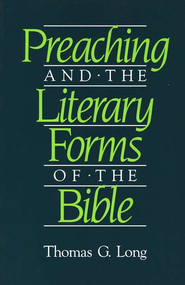Thomas Long: Preaching and the Literary Forms of the Bible
 Thomas G. Long, Preaching and the Literary Forms of the Bible (Philadelphia: Fortress Press, 1989), 144 pages.
Thomas G. Long, Preaching and the Literary Forms of the Bible (Philadelphia: Fortress Press, 1989), 144 pages.
I recommend this book to all preachers who are serious about being true to the specific genres within the Scriptural text. Applying the principles in this book will help you in your preaching ministry and open up your mind to the different genres of Scripture. You will want to keep this volume in your library and read it several times.
Thomas G. Long is a senior fellow of the Academy of Homiletics and is one of the leading homileticians of our time. One of his main themes is the form and the function of the text—the genre of the text and things implied in the text. His method builds upon the exegetical and historical method.
This book will be helpful to preachers who want to accurately translate the text, exegete it and apply it to their preaching. One of the things missing among some preachers is a proper grasp of the homiletical genres of the text. Preaching the genre of the text will help you to be true to the Word of God, preaching more accurately. For example, the genre of the Psalms is different from the genre of the parables, therefore sermons should each be outlined differently.
One of the problems I had reading Long’s book was understanding his writing style. However, once you understand his method of writing, this book is good reading. He does not give examples of the genres until chapter eight were he gives general principles in outlining the genres of the Bible. I felt that this chapter should have been the first chapter of the book.
In chapter eight he gives some very good principles. In moving from the text to outlining the sermon, he suggests the preacher should do a number of things. Allow the movement of the sermon to follow the movement of the text. In other words the main points should flow from the main blocks of thought in the sermon. Allow the opposing forces of the text to become the opposing forces in the sermon. For example, in Psalm 1 the text compares the good man and the evil man. Allow the central insight of the text to be the central insight of the sermon, therefore, if the main idea of the prodigal son is God’s love for the undeserving sinner; then the preacher’s main theme should be God’s love for the undeserving sinner. Allow the mood of the text to set the mood of the sermon. Generally I find this idea works well if the mood of the sermon is joy, such as in Phil. 2:5. However this becomes problematic when the theme of the text is sorrow. I found these principles to be very helpful in preparing sermons.
The only contention I have with the approach above is that it is much better to end a sermon on the major theme of the New Testament: the resurrection. The resurrection can be translated into hope, victory and celebration. Celebration is a major theme of the New Testament and of African American preaching. In our preaching style we want to give hope to a dying world. For example, we can preach about Hell as a place of torment where we do not want to go, but we need to point out that we have hope in Jesus and heaven to gain if we trust Him as our Savior.
Reviewed by Aldwin Ragoonath
Category: Ministry, Summer 2007



